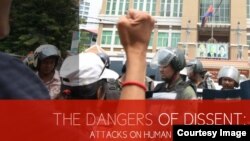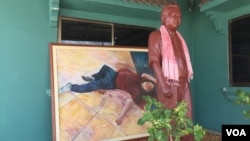A report accusing the Cambodian government of attacks on human rights defenders and dissidents has been dismissed by the authorities.
The report from the Cambodian League for the Promotion and Defense of Human Rights (Licadho), titled “Dangers of Dissent: Attacks on Human Rights Defenders”, claimed Prime Minister Hun Sen’s government had harassed rights workers through the judicial system, committed acts of state-sponsored violence and had been intolerant of peaceful protest.
The report included an account of the murder of dissident political analyst Kem Ley, who was fatally shot at a gas station in the capital one year ago this week in a killing widely thought to be connected to the state.
Kim Sok, another prominent political commentator, is currently being held in a pre-trial detention on criminal defamation charges for allegedly accusing the government of involvement in the murder.
The report continued to detail the arrest restrictions on freedom of assembly, such as the detention of a group of youths who had arranged a private screening of an Al Jazeera investigative documentary which uncovered evidence linking officials from the ruling Cambodian People’s Party and the military to Ley’s murder.
Sok Eysan, CPP spokesman, rejected the allegations, pointing to Cambodia’s relatively free press as evidence of the party’s respect for human rights.
“In some countries, they first check the meaning of radio, television and newspaper [content],” he said, referring to censorship in other countries. “It’s completely different in Cambodia, where there is no need to check the meaning. In some cases, if there is a complaint or a mistake, the state just asks for a correction.”
The Licadho report went on to detail what it said was the routine shutting down of peaceful protests and inflammatory rhetoric in the run up to local elections last month.
Eysan defended the arrests of activists and members of the opposition, saying Licadho had “only looked at one side” of the issue.
“Human rights workers are not perfect. They must respect the law and internal regulations,” he said.
Yoeung Sotheara, a legal observer with election monitor Comfrel, said it was this attitude of denial of responsibility by the government that led it to lose control of hundreds of local councils at the June 4 election.
“That’s why the CPP result dropped dramatically in urban areas, especially in Phnom Penh,” he said.
The Licadho report once again raised questions over the use of irregular security forces in crackdowns on dissent, specifically district security forces which have been used as a vanguard to violently dispersing peaceful protests.
“Para-police—security guards regularly deployed along side police—have become a recurring feature of gatherings expressing any kind of anti-government narrative. Baton-wielding para-police are used to violently disperse protests, often specifically targeting union or grassroots group leaders,” the report notes.
“Despite systematic and recurring acts of violence by para-police against peaceful protesters, not one has never been prosecuted, and police routinely stand by as para-police commit violence with impunity.”
General Khieu Sopheak, interior spokesman, however, said if Licadho was “disappointed with anyone” it should file a complaint to the authorities it is accusing of malpractice, “because our country has law and norms.”
“If we just based what we do on what they say and it is hell, then we would all be living in hell,” he added.











